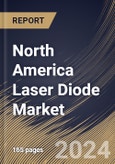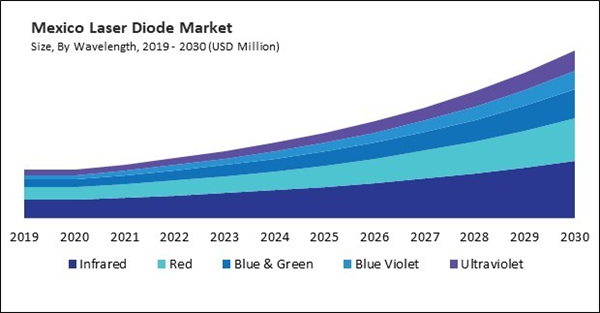The US market dominated the North America Laser Diode Market by Country in 2022, and would continue to be a dominant market till 2030; thereby, achieving a market value of $3,265.3 million by 2030. The Canada market is experiencing a CAGR of 14.9% during (2023 - 2030). Additionally, The Mexico market would exhibit a CAGR of 13.9% during (2023 - 2030).
The market is a prominent example of efficiency and innovation in contemporary technology, serving as a guide to a vast array of applications in numerous industries. By utilizing a p-n junction, a laser diode generates coherent light, exhibiting consistent phase and frequency across the entire electromagnetic spectrum. It produces this coherent light via "Light Amplification by Stimulated Emission of Radiation," or LASER. Various synthetic light sources and natural sunlight emit waves characterized by dissimilar wavelengths and an outward phase difference.
Furthermore, it should be noted that the light waves produced by monochromatic light sources such as incandescent bulbs do not coincide in phase. In contrast to earlier light sources, it generates a concentrated electron beam of laser light characterized by light waves of identical magnitude that propagate in unison and possess aligned peaks. As a consequence, laser beams exhibit extreme brilliance and possess a minute region of concentration. Laser diodes and semiconductor lasers are the most compact and efficient laser light-generating devices.
Moreover, the Government of Canada aims to provide all Canadians access to quick, dependable, reasonably priced mobile and Internet services. In order to encourage better connection and access to the newest wireless technologies, the Canadian government continues to make additional spectrum available. The creation of a 5G center of excellence in Montréal will cost $77 million, according to the Ministry of Innovation, Science and Industry. As 5G networks mature, network providers search for ways to automate their business processes. Therefore, as telecommunication networks evolve to meet modern connectivity demands, the demand for laser diodes will remain strong, presenting opportunities for manufacturers and suppliers.
Based on Wavelength, the market is segmented into Infrared, Red, Blue & Green, Blue Violet, and Ultraviolet. Based on Technology, the market is segmented into Distributed Feedback, Separate Confinement Heterostructure, Double Hetero Structure, Quantum Well & Cascade, and VCSEL & VECSEL. Based on Doping Material, the market is segmented into Gallium Arsenide (GaAs), Gallium Aluminum Arsenide (GaAIAs), Gallium Nitride (GaN) & Indium Gallium Nitride (InGaN), Gallium Indium Arsenic Antimony (GaInAsSb), Aluminum Gallium Indium Phosphide (AIGaInP), and Others. Based on End Use, the market is segmented into Consumer Electronics, Telecommunication, Industrial & Automotive, Medical & Healthcare, and Others. Based on countries, the market is segmented into U.S., Mexico, Canada, and Rest of North America.
List of Key Companies Profiled
- Coherent Corp.
- IPG Photonics Corporation
- Jenoptik AG
- Lumentum Holdings, Inc.
- MKS Instruments, Inc.
- ams-OSRAM AG
- Rohm Semiconductors Co., Ltd.
- Sharp Corporation
- Ushio, Inc.
- Hamamatsu Photonics K.K.
Market Report Segmentation
By Wavelength- Infrared
- Red
- Blue & Green
- Blue Violet
- Ultraviolet
- Distributed Feedback
- Separate Confinement Heterostructure
- Double Hetero Structure
- Quantum Well & Cascade
- VCSEL & VECSEL
- Gallium Arsenide (GaAs)
- Gallium Aluminum Arsenide (GaAIAs)
- Gallium Nitride (GaN) & Indium Gallium Nitride (InGaN)
- Gallium Indium Arsenic Antimony (GaInAsSb)
- Aluminum Gallium Indium Phosphide (AIGaInP)
- Others
- Consumer Electronics
- Telecommunication
- Industrial & Automotive
- Medical & Healthcare
- Others
- US
- Canada
- Mexico
- Rest of North America
Table of Contents
Companies Mentioned
- Coherent Corp.
- IPG Photonics Corporation
- Jenoptik AG
- Lumentum Holdings, Inc.
- MKS Instruments, Inc.
- ams-OSRAM AG
- Rohm Semiconductors Co., Ltd.
- Sharp Corporation
- Ushio, Inc.
- Hamamatsu Photonics K.K.









